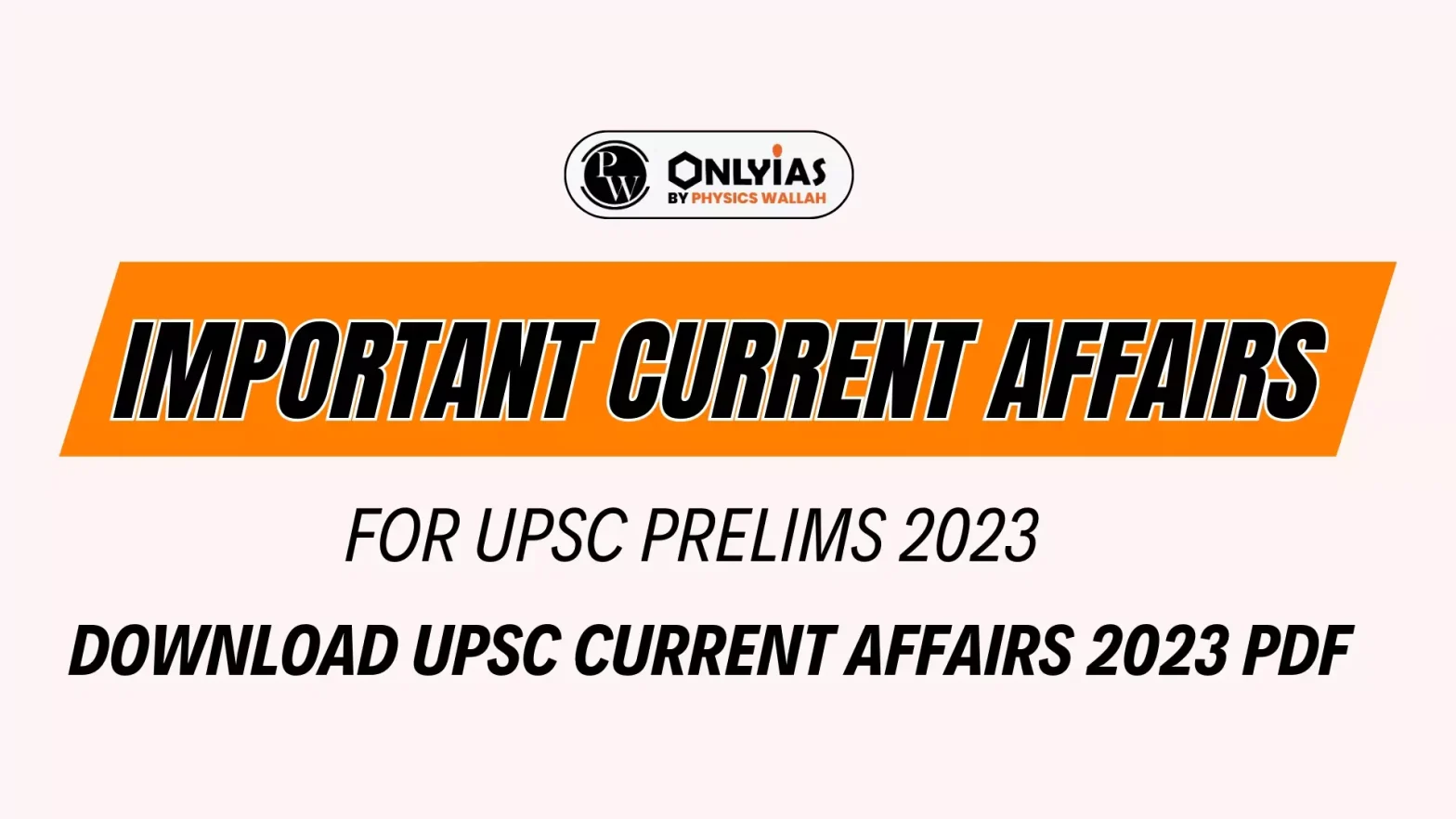
Important Current Affairs for UPSC Prelims 2023: Current Affairs is an integral part of the UPSC Civil Services Exam preparation as the questions based on current affairs are asked in all the selection stages i.e. preliminary, mains, and interview round.
Going by the previous current affairs trend in UPSC Prelims, it is observed that the number of questions associated directly or indirectly with current affairs is increasing every year. Therefore, aspirants should cover all the important current affairs for UPSC Prelims 2023 in their preparation.
As per the UPSC prelims syllabus 2023, the General Studies paper I cover topics such as current events of national and international importance. Thus, candidates should stay updated with all the latest events happening across the globe.
Hence, it is advisable to go through the UPSC previous year’s question papers of the prelims exam to understand the weightage of current affairs and the number of current affairs questions asked every year.
This will also provide insights into how current affairs are associated with the other aspects of the syllabus. Moreover, it will help aspirants to prepare the right strategy to excel in the current affairs section.
Read this article to get insights into the important current affairs for UPSC Prelims 2023, along with the list of important topics, expert-recommended strategy, and best resources.
There are many benefits of reading current affairs for UPSC Prelims 2023. Hence, it is advisable to memorize and revise current affairs questions regularly to maximize the scores in the exam. The list of benefits of reading current affairs for UPSC prelims 2023 is as follows:
Candidates must check the latest UPSC Prelims 2023 syllabus to get an idea of the important current affairs topics from which questions can be asked in the prelims exam. Let’s discuss the current affairs topics for UPSC Prelims 2023 for ease of the aspirants.
| Important Current Affairs for UPSC Prelims 2023 | |
| Section | Sub-topics |
| Polity | Sub- constitution of India, governance, SC-ST rights, fundamental rights, social issues, Rajya Sabha, Lok Sabha, center-state relations, electoral reforms, Bills and Acts, cooperative issues, etc. |
| Art & Culture | National heritage sites, monuments, national festivals, dance forms, regional festivals, painting, etc. |
| International | Indian visits: bilateral and multilateral, international organizations, political news, etc. |
| Environment | Biodiversity at regional, national, and global levels, major Biodiversity hotspots, climate change, Wildlife- threatened species, Conservation of Biodiversity, IUCN endangered species, COP, ozone depletion, etc. |
| Economy | Indian economy, banking and finance, NPA issues, India and its trade agreement, banking reforms inflation, poverty, inequality, International reports and indices, Indian economy sector, and multilateral platforms for trade, WTO, Unemployment, IMF, World Bank, etc. |
| Science and Technology | New scientific developments, communication technologies, Indian Space Program, biotechnology, artificial intelligence (AI), etc. |
| Government Schemes | Government policies, changes/amendments in existing laws. Annual Budget and Economic Survey overview of the current year. |
When formulating the strategy to read important current affairs for UPSC Prelims 2023, the first question that arises in the mind of the aspirant is “How many months current affairs for UPSC prelims 2023 is required?”
The answer is that the aspirant should cover current affairs of at least the last 14-15 months as per the past current affairs analysis in UPSC Prelims over the years.
Now coming to the UPSC prelims strategy for current affairs, aspirants should first analyze the syllabus carefully and create a subject list such as History, Geography, Economics, environment, international relation, security, polity, society, Science & Tech, etc.
Furthermore, divide these subjects into sub-topics, such as economics covers sub-sections like economic growth, infrastructure, food processing, etc. In the same way, divide all the subjects into sub-topics and then devote time to each and every topic accordingly.
The next strategy must be reading the newspaper as per the subtopics, preparing notes, and revising every day. However, they should not completely rely on newspapers as short notes require regular updation and revision.
Candidates can also solve previous year UPSC prelims PYQs to get an idea of the type of questions asked from current affairs sections. With this, they should download UPSC Prelims 2023 Answer Key to determine the number of correct and incorrect responses marked by them.
Candidates are advised to inculcate the habit of reading newspapers daily and creating notes out of it. However, they should use limited resources for the preparation of current affairs to save the wastage of their time.
Thus, they must read multiple news from the same sources. With this, they must revise regularly to retain important current affairs topics for a longer period. Here, we have compiled the best sources to cover important current affairs for UPSC prelims shared below for the reference of the candidates.
Q1. How many months of current affairs for UPSC prelims 2023 is required?
Ans. Candidates should cover current affairs of at least the last 14-15 months for effective UPSC prelims 2023 exam preparation.
Q2. What are the important current affairs for UPSC Prelims 2023?
Ans. Some important current affairs topics for UPSC Prelims 2023 include polity, art & culture, government schemes, economy, science & technology, etc.
Q3. Which current affairs magazine is best for UPSC Prelims 2023?
Ans. Some of the best current magazines for UPSC Prelims 2023 are Monthly Current Affairs Magazine by OnlyIAS, OnlyIAS Kurukshetra Magazine, OnlyIAS Youjna Magazine, etc.
<div class="new-fform">
</div>